Jl Audio Amp Design to Create 400 Watts Continuous Power to a Dual Voice Coil 10 inch Sub
Dual voice speakers (which are usually subwoofers) can be confusing, that's for sure. To make matters worse, if you don't know how to properly choose or wire a dual voice coil speaker you can getless sound & power than you expect!
To help you figure it all out, I've put together this friendly how-to guide with detailed diagrams, answers to several common questions, and more. You can download & print the subwoofer wiring diagrams if you like.
Want to know how to wire your dual voice coil subwoofer or match the right kind to your amplifier? Read on to find out more.
Contents
- What is a dual voice coil speaker?
- What is the difference in dual voice coil and single voice coil subwoofers?
- Do dual voice coil speakers have performance differences?
- Single vs dual voice coil subs: which is better?
- Dual voice coil subwoofer advantages
- How to choose & match a dual voice coil subwoofer to your amp
- 4 Ohm dual voice coil sub wiring diagram
- 2 Ohm dual voice coil sub wiring diagram
- 8 Ohm dual voice coil sub wiring diagram
- More helpful articles
What is a dual voice coil speaker?
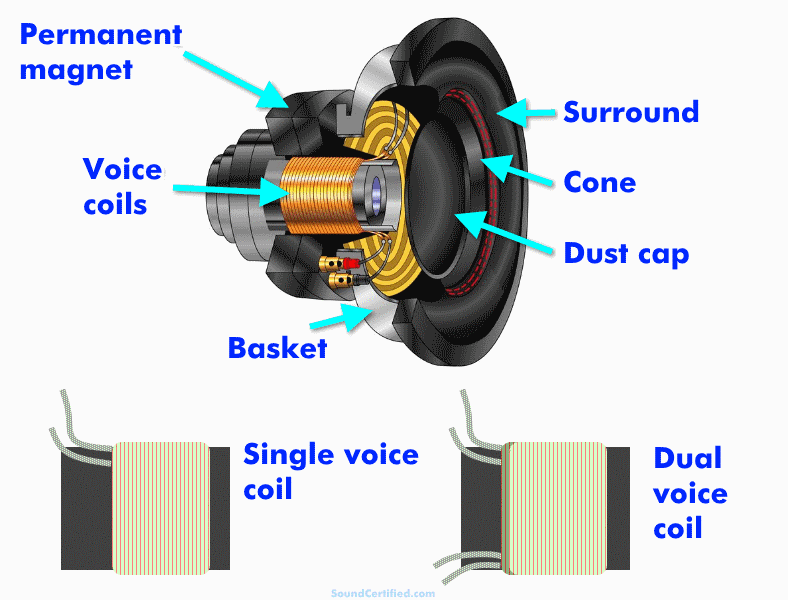
Dual voice coil speakers are extremely similar to single voice coil models except for having a 2nd voice coil winding, wire, and wire terminals. They both use a small gauge wire tightly wound on a speaker "bobbin" (tube) that rests inside a magnet attached to the cone. They produce sound when a musical signal is supplied.
Dual voice coil (DVC) speakers, which are most often subwoofers, are almost the same as standard single voice coil speakers. The difference lies in their design & how they're used.
What is the difference in dual voice coil and single voice coil subwoofers?
Standard speakers or subwoofers have the following parts:
- A metal basket in which the speaker parts are housed and a magnet is attached to
- Large permanent magnet
- Speaker cone surround
- Speaker cone surround & dust cap
- Voice coil bobbin (tube where the coil is made)
- A "spider" which is a stiff but flexible material that suspends the voice coil assembly
- Voice coil: tightly wound small gauge wire of a large length (this is suspended inside a gap in the magnet)
- Voice coil wire leads & connection terminals
Single voice coil subwoofers have only one speaker voice coil winding while dual voice coil models have a 2nd voice coil of the same Ohm rating (impedance) added in the bobbin.
A 2nd pair of wire leads and speaker wire terminals are added, too.
Do dual voice coil speakers have performance differences?
There aren't any direct performance differences between a single and dual voice coil model of the same design. However, there are definitely some really nice advantages I'll explain later.
In most cases, dual voice coil subwoofers areslightly more expensive than the same model with single voice coil design – but not by very much. Power handling ratings are usually very similar (always double-check to be sure) but might be a bit different.
If you're into speaker box design, it's helpful to know that dual voice coil speakers often have slightly different Thiele/Small parameters. Thiele/Small parameters are just the highly detailed technical characteristics of a speaker that help know how it behaves in certain speaker boxes or audio crossover designs.
Single vs dual voice coil subs: which is better?
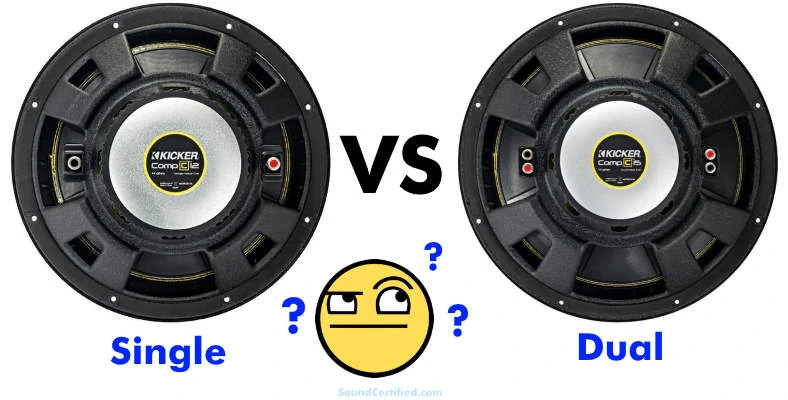
There isn't a "best" choice when it comes to single or dual voice coil speakers & subwoofers.
When it comes to choosing one or the other, the answer is "it depends." Whether or not you should use single or DVC subwoofers depends on a combination of things:
- The minimum speaker load (Ohms) rating of your amplifier
- Whether your amp is stereo only or bridgeable
- How many speakers/subwoofers you'll be using
Most, but not all, higher power car amplifiers are bridgeable while home stereo amplifiers in many cases aren't. As a reminder,never assume your amplifier is bridgeable – always check!
Dual voice coil subwoofer advantages
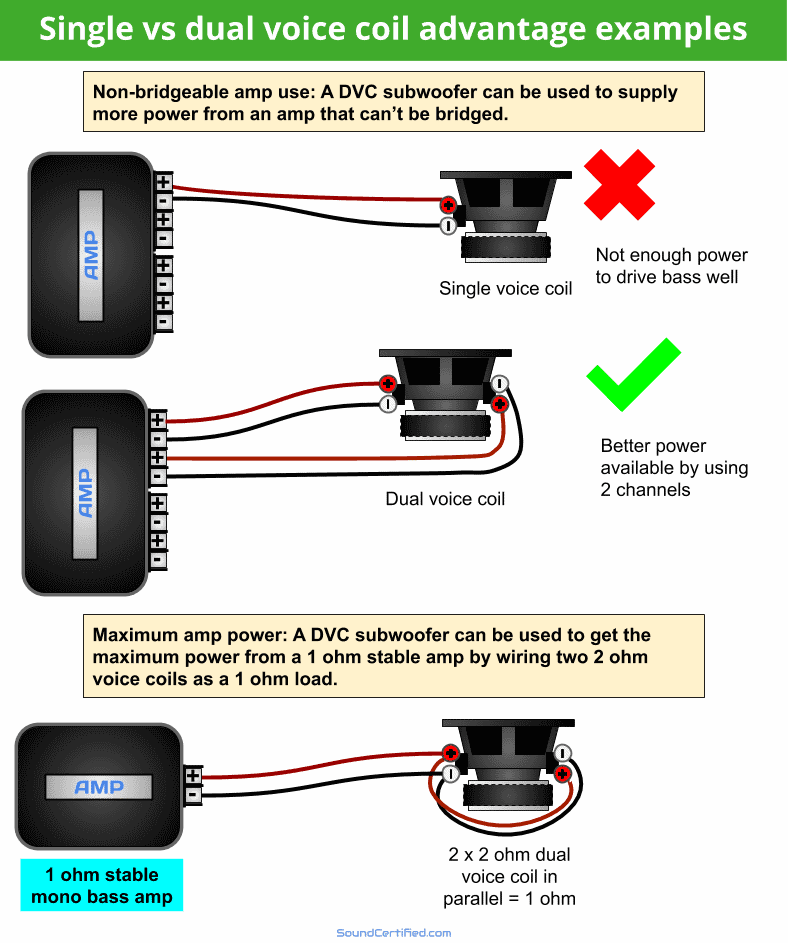
It's true that standard (single voice coil) subwoofers are fine for many systems. But without question, a lot of people are limited by using them, while dual voice coil subwoofers offer some great flexibility & advantages.
1. Maximum amp power output
These days, most car amplifiers have certain power ratings (in Watts) at a specific speaker load Ohm rating. For example, a mono amplifier might have the following power ratings:
- 350W RMS at 4 ohms speaker load
- 600W RMS at 2 ohms
- 1,000W RMS at 1 ohm
Let's say you'd like to use a single (mono) bass setup and only one subwoofer. Ordinarily, you'd be limited to getting a maximum of 600W from the amp since you'll usually only find 2 ohms or higher subwoofers available.
While youcould add a 2nd 2 ohm subwoofer and wire both in parallel, that would mean having to get a bigger box, spend more money, use more installation space, and so on.
A 2 ohm DVC subwoofer could be used and wired in parallel to allow the amp to put out its full power. Otherwise, you'll never reach the power capacity you paid for with your amplifier.
That'sespecially true today since modern class D amplifiers have ratings like this and some are 1 ohm capable.
2. Amplifier channels and special setups
As I mentioned earlier, not all amplifiers can be bridged. That's abig problem if you've got a single 4 channel amplifier, for example. How can you add a subwoofer and supply it with enough power without having to buy a second amp?
With a dual voice coil subwoofer, you could use one channel for each of the voice coils to drive the subwoofer with enough power. Likewise, for truly powerful systems, it's possible to one amp per each voice coil for single or multi-subwoofer systems.
3. Multiple subwoofers/amp impedance matching
When you're wiring several subwoofers to the same amplifier channel or mono bridging two channels, the Ohms load you amp sees depends on the series or parallel wiring combination of the subwoofers.
Dual voice coils subs offer several more options as they let you choose more total Ohm load combinations that can better match your amp's minimum rating.
4. Ability to use them for home for car stereo systems
Ordinarily, it's not possible to use 8 ohm subwoofers efficiently for car audio since they can't produce the same power as a 4 ohm speaker of the same kind. Car subwoofers with 2 or 4 ohm ratings can't be used with home stereo amplifiers because they're below the minimum amp spec.
They'll cause a home amp to overheat, shutdown, and even become damaged permanently.
Dual voice coil speakers have a unique benefit here as you could use a dual 4 ohm subwoofer forboth car or home use:
- Wired in series for 8 ohms for home stereo use
- Using a single 4 ohm or parallelled to 2 ohms for car stereo amp use
It's especially nice if you're able to get a great price on speakers as you'll be able to use them when otherwise you couldn't.
How to choose & match a dual voice coil subwoofer to your amp
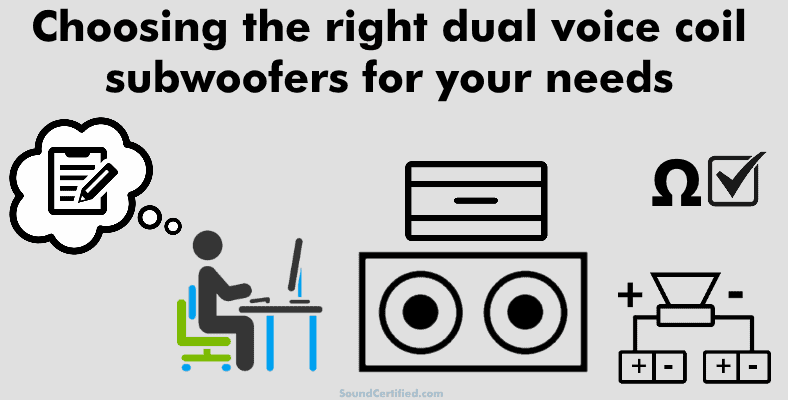
To get the right dual voice coil subwoofers, you'll need to note a few things:
- The minimum speaker load (Ohms rating) of your amplifier at the power level you're interested in
- How many subwoofers you'd like to use
The rest is relatively easy! Just use my wiring connection diagrams below and you'll find the right subwoofer(s) configuration you should use.
You'll need to check the owner's manual (or labeled printed) for the amplifier to get the minimum speaker load you can use along with the maximum power rating Ohm load. Then pick the right number of dual voice coil subwoofers that can be wired to match that required by the amp.
If you're unsure of anything feel free to ask me by commenting below or sending a message.
4 Ohm dual voice coil sub wiring diagram
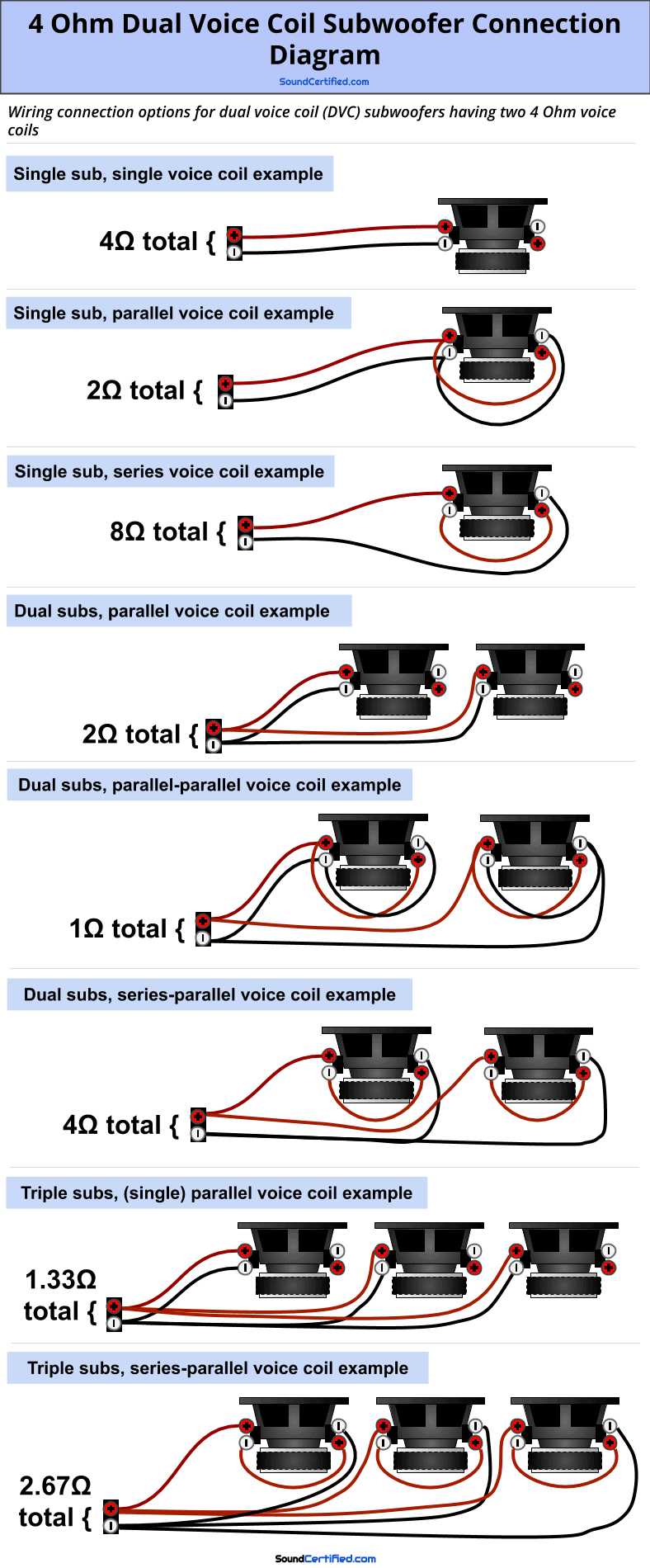
Click here to download the .PDF version you can view or print
2 Ohm dual voice coil sub wiring diagram

Click here to download the .PDF version you can view or print
8 Ohm dual voice coil sub wiring diagram
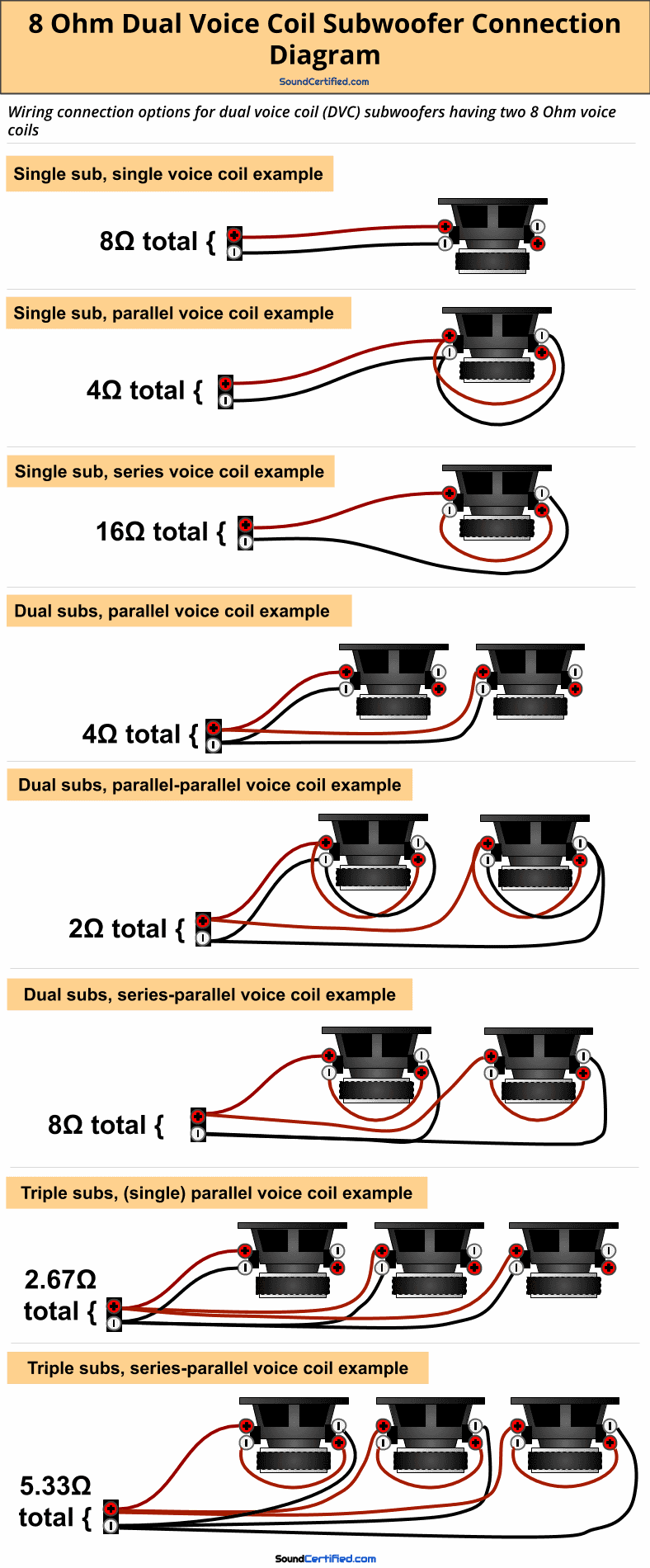
Click here to download the .PDF version you can view or print
More helpful articles
I've got some great (andvery detailed) guides to help you with your audio needs:
- Here's a detailed post to tell you what size speaker wire you need.
- Never bridged an amplifier before? No problem! Find out here how to bridge an amplifier.
- In my how to install an amplifier and sub guide you'll learn how to install your own great-sounding system.
Source: https://soundcertified.com/how-to-wire-dual-voice-coil-speaker-subwoofer-wiring-diagrams/
Post a Comment for "Jl Audio Amp Design to Create 400 Watts Continuous Power to a Dual Voice Coil 10 inch Sub"